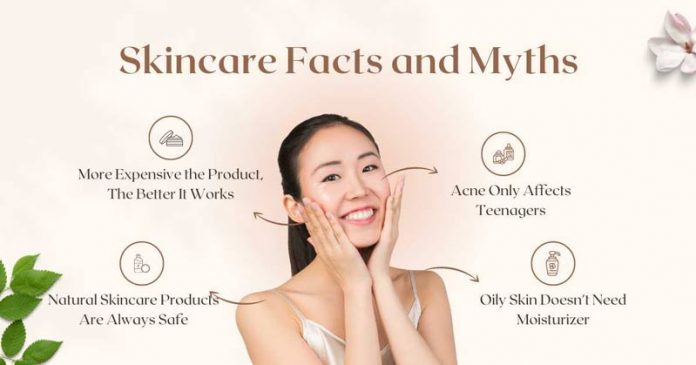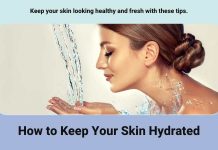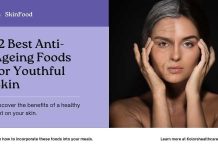Most of you will be keen on improving your appearance and following a strict skincare regime to flaunt healthy skin. During your hunt for skincare tips, you will have come across a multitude of information on what work works and what wouldn’t.
Every beauty magazine, article, or beauty product will suggest that following different practices will be best for your skin. These can be confusing, and choosing the right product that best suits your skin can become arduous. Fret not. We are here to help. Donning our detective hats, we try to clear up those common myths and underrated facts surrounding the beauty world to find definitive answers.
List of Top 10 Skincare Facts and Myths
Myth #1: The More Expensive the Product, The Better It Works
The common misconception is that choosing premium skincare products from a popular brand with an expensive price tag will work wonders for your skin. The price range of a product doesn’t determine its effectiveness.
Fact: Most of the time, you will find that an affordable skincare product might work well for your skin compared to its pricey counterparts. The effectiveness of a skin product is determined by the quality of its powerful ingredients and not by the price range.
Myth #2: Natural Skincare Products Are Always Safe and Effective
While it’s good that people are becoming aware of the significance of maintaining skin health and using chemical-free products, are they well-informed? There is a growing demand for natural skin care products among buyers in their pursuit of maintaining chemical-free skin.
Fact: Although natural products might have natural organic ingredients, they might not ensure healthy skin. Sometimes, a few natural ingredients might not suit your skin type and may lead to allergic reactions or irritations, unlike chemical-based products.
In a study it was found that there are “loopholes for natural substances” used in the personal care products. The researchers were able to find substances that were hazardous to skin and eyes were used. (source)
Myth #3: Acne Only Affects Teenagers
Acne breakouts are always linked to the puberty stage of teenagers to portray it as a passage to adulthood. This might be due to the changes in hormonal level levels in their body may cause acne. Teenagers use products containing benzoyl peroxide or salicylic acid to get rid of acne. However, they stop using these skincare products as soon as they grow into adults, thinking acne wouldn’t reappear.
Fact: American Academy of Dermatology states that around 50 million adults in America have acne. This indicates that acne affects teenagers and can cause breakouts in adults too. Excess oil secretion, poor diet, genetics, hormone changes, and work stress can trigger adult acne. If you are an adult suffering from frequent acne breakouts, seek professional help immediately. You can use products with clay, tea tree oil, charcoal, green tea, and beta-hydroxy acids to maintain flawless skin.
As per a study, it was found that people have acne beyond their teenage years. Below are some of the findings of the study (Source)-
- 50.9% of women and 42.5% of men in their 20s
- 35.2% of women and 20.1% of men in their 30s
- 26.3% of women and 12% of men in their 40s
Myth #4: The More You Scrub, The Cleaner Your Skin Will Be
While growing up, you might have heard from your grandmother or mother that you must scrub well to have flawless skin. However, too much scrubbing of your skin can deprive it of its natural oils, dry it, and irritate it.
Fact: While scrubs are a great way to exfoliate the skin to remove dirt, grime, and dead cells, overdoing it can cause damage to the skin’s protective layer. The harsh particles in the scrub cause abrasions. It can make your skin prone to infections and irritations, which might lead to scars and discoloration. Follow a gentle exfoliation session using a mild scrub with gel beads to prevent skin irritations.
Myth #5: Using Skincare Products with Higher SPF Provides Better Sun Protection
Whether it is lipstick, foundation, or a moisturizer, the common claim they all seem to make is that they have a very high SPF. You believe that products having better SPF strength provide excellent protection against the sun and prevent skin damage. However, this myth isn’t true.
Fact: The Sun Protection Factor or the SPF works differently. This indicates there is no need to invest in a product with a very high SPF. A product with SPF 50 can block up to 98% of UVB rays, while those with SPF 30 can shield up to 97% of UVB rays. So, using products with SPF 30 is more than enough when stepping out daily. (Source)
Myth #6: Oily Skin Doesn’t Need Moisturizer
Most often, you believe that oily-skinned beauties have well-hydrated skin, which rules out the need to moisturize. There is also a common belief that people with oily skin develop wrinkles slowly, as they have natural oil production on their skin. Some might also believe as their skin is always oily, there isn’t any need for extra hydration. They fear it might lead to clogging of skin pores and acne breakouts.
Fact: This popular belief ignores that every skin type requires some form of hydration. Having oily skin doesn’t prevent dehydration or dryness caused by dry air in the environment. Moisturizing your skin keeps your health intact, even if you have naturally glowing, oily skin. Choose products with a lightweight formula and matte effect to prevent a greasy look. Also, go for gel-based serums with humectants to trap the actives in them for optimum skin health.
Myth #7: Natural or Organic Products Are Always Better for Your Skin
Some of you might choose a beauty product based on the ingredients you trust or recognize. Few others believe the ones that come with “natural” or “organic” labels. You may even think that chemical-free or natural is a better choice for treating specific skin issues, as they do not contain synthetic ingredients.
Fact: This myth isn’t true. Choosing skincare products with gentle chemical ingredients possessing specific medicated properties will help relieve your particular skin condition. However, please avoid harsh chemicals like PEG, alcohol, sulfates, parabens, or added fragrances, as they might irritate your skin.
Myth #8: You Can Get Rid of Wrinkles and Fine Lines Completely
Several anti-ageing products are often marketed with tall claims like “get young-looking skin overnight” or “feel 25 years younger with this anti-wrinkle product”. The common belief surrounding these products is that they will magically erase every forehead, wrinkle, crowfeet, and laugh line with a single use. But sadly, these are just beauty scams or marketing gimmicks.
Fact: Several anti-ageing products from reputed brands are formulated with powerful ingredients like rosehip oil, retinol, or glycolic acid. These potent ingredients are effective for ageing skin, as they can slow down the ageing signs but not erase them magically. They work by improving collagen production and lowering the occurrence of wrinkles and fine lines. These products can take a few weeks to enhance skin elasticity and firmness but can’t erase existing wrinkles. Practice yoga, maintain a skincare routine, eat right, and wear sunscreen to have young skin. You can also get help from experts or check out Kolors Healthcare skin care clinics to get expert help. These treatment solutions will help you effective anti-agening treatments that lasts longer.
Myth #9: Acne Is Caused by Poor Hygiene or Eating Chocolate and Greasy Foods
When your tight work schedule causes stress and anxiety, gorging on processed and fried foods loaded daily with sodium or sugar. Are these foods responsible for causing acne?
Fact: Let’s get this straight. Chocoholics and snack lovers can heave a sigh of relief. According to a study, there is no connection between acne breakouts and the consumption of chocolates or diary-based foods (source). Smoking habits, family history, hormones, and akin type might also be the causes of acne.
Myth #10: Products That Sting or Burn Are Working Effectively
Did the new skin product that you used causing a burning or stinging sensation after application? While you might think it is the effect of working well on your skin pores, the reality is that it is asking for help.
Fact: When the product you apply is stinging or burning, it indicates it is allergic to your skin. Pain or irritation arises due to an allergic reaction caused by the ingredients present in the product. Discontinue using the product immediately and wash your face. Try applying aloe vera gel or an ice pack to lower the tingling or burning sensation. Always make a patch test before using a new product to avoid such skin reactions.
Cosmetic Industry in India – Facts & Data Points
| Statistics/Facts | Data |
|---|---|
| Market Size | $14.8 billion USD |
| Revenue (2023) | $6.27 billion USD |
| Market Size (Projected, 2025) | $20 billion USD |
| Compound Annual Growth Rate (2019-2025) | 7.10% |
| Leading Cosmetics Company (2023) | L’Oréal India, Lakme, and Hindustan Unilever Limited |
| Cosmetics Exports (2022) | $2.9 billion USD |
| Most Imported Cosmetics Category (2020) | Skincare products |
| E-commerce Contribution to Cosmetics Sales | 5-7% |
| Growing Segment in the Industry | Men’s grooming products |
| Regulatory Authority | Food Safety and Standards Authority of India |
| Prominent Online Cosmetics Retailers | Nykaa, Amazon, Flipkart, Myntra, Purplle |
Final Thoughts
We hope this write-up cleared all your concerns about some of the skincare myths in the beauty world. By now, you will clearly know what will work for you and what will not. Ensure you stay clear of all kinds of wrong information and rely on credible and reliable sources.
Skincare Myths and Facts FAQs
Does sunscreen prevent skin damage if you are wearing it every day?
Yes, wearing sunscreen daily protects your skin from harmful UV rays. According to a study, regular sunscreen use reduces the risk of melanoma by 50% to 73% (Source: American Society of Clinical Oncology).
Does diet change the appearance of your skin?
Yes, diet plays an essential role in skin health. A study by Yunnan Agricultural University, China, found that a diet high in fruits, vegetables, and whole grains is associated with wrinkles (Source). A diet rich in antioxidants, omega-3 fatty acids, vitamins C and E also helps get healthier skin.
Can stress and anxiety cause body acne?
Yes, stress can impact the worsening of acne. A study by the Department of Dermatology, Stanford University School of Medicine, revealed that subjects with high-stress levels experienced more severe acne flare-ups than those with low-stress levels. (Source). Stress triggers hormonal changes and increases inflammation, contributing to the development or worsening of acne.
Can smoking cigarettes accelerate skin aging?
Yes, smoking cigarettes accelerates skin aging. Research done by the Department of Geriatric and Environmental Dermatology states, “Smoking has deleterious effects on the skin.” (Source). Smoking results in increased wrinkles, skin dryness, and reduced skin elasticity. Smoking damages collagen and elastin, which leads to premature wrinkles and sagging skin.









